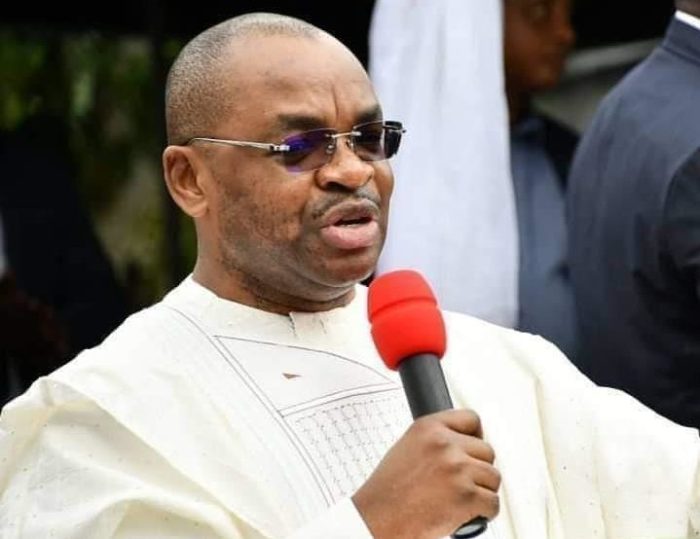Latest News
JUST IN: Akwa Ibom Assembly begins probe of ex-Gov Udom Emmanuel’s administration

The Akwa Ibom State House of Assembly has opened an investigation into the ownership of several companies reportedly established during the tenure of former governor Udom Emmanuel.
According to the Assembly, some of these firms have questionable ownership structures, raising concerns about transparency and possible state involvement. Of particular interest is the Saint Gabriel Coconut Refinery Project, located in Mkpat Enin Local Government Area. The refinery, which was named after Emmanuel’s late father, is among the projects under scrutiny.
Several others, all concentrated around his Awa Iman community in Onna local government area, including the Flour Mills, Syringe Manufacturing Company, Plywood Company, and others, checks by our correspondent revealed, had since folded a little over two years after leaving office on May, 29, 2023.
Others include the toothpicks and pencil manufacturing companies, which have folded with several workers laid off.
However, in response to the protracted non-payment of seven months’ salaries to workers at the St. Gabriel Coconut refinery, who have since downed tools, the speaker of the Assembly, Hon. Udeme Otong (Abak), has constituted a joint committee to investigate the plant’s ownership status.
Amid widespread opposition and petitions by the aggrieved landowners, the governor had forcefully acquired large hectares of land around the immediate host communities of Mkpat Enin, Eastern Obolo and Ikot Abasi local government areas for coconut plantations for raw materials to feed the plant without compensation.
He had appealed to the angry landowners to have patience, preaching long-term gains in employment and Internally Generated Revenues (IGRs), given the fact that the price of coconut oil/per litre far outweighed that of crude oil.
But after years of unproductivity with the plant closing shop against the workers, the House of Assembly has risen to uncover its ownership status.
Consequently, Speaker Otong constituted a probe Committee comprising some of the House’s Standing Committees on Agriculture and Natural Resources and Labour and Productivity, with the mandate to “ascertain definitively whether the refinery is owned by the Akwa Ibom State Government or a private entity.”
It was learnt that as part of the investigation, “the panel is to interface with relevant agencies, affected workers, the State Ministry of Agriculture, and the Commissioner for Labour.”
Speaker Otong gave the directive following a motion raised by Hon Uweh Peter Imoh-Ita, a member representing Mkpat Enin State Constituency, during the plenary session.
Presenting a motion titled; “Urgent need for the Akwa Ibom State government to pay the seven months salary arrears of workers at Saint Gabriel Coconut Plantation and OIL Refinery, Mkpat Enin, Ikot Abasi, and Eastern Obolo Local Government Areas”, Imoh-Ita told the House that “the State government employed the workers through ministry of agriculture to work in the plantation and refinery in 2006, to help drive agricultural and industrial development.”
He recalled that the workers were receiving their monthly salary until December 2024.
“Aware that in 2016, the Akwa Ibom State Government, through the Ministry of Agriculture, employed several indigenes to work at the Saint Gabriel Coconut plantation and Oil Refinery, with operational sites in Mkpat Enin, Ikot Abasi, and Eastern Obolo LGAs as part of the State’s agricultural and industrial development drive.
“Further aware that these workers diligently rendered their services and have been receiving their monthly salaries from 2016 until December 2024, after which salary payments were abruptly stopped without formal communication, leaving the workers unpaid for seven months to date”.
The lawmaker said he was concerned that despite workers who are parents and breadwinners who were compelled to stop going to work due to non-payment and lack of transportation visiting the Ministry of Agriculture, the ministry was doing nothing.
“Concerned that despite visits by the affected workers to the Ministry of Agriculture, assurance given to them regarding payment has not been fulfilled, thereby exacerbating their financial hardship amid rising living and transportation costs.
“Worried that some of these workers, who are parents and breadwinners, have been compelled to stop going to work due to inability to avoid consequences of the non-payment,” he stressed.
While urging the state government through the ministry of agriculture, to urgently pay the seven months salary arrears and other entitlements owed to the affected workers, Imoh-Ita said he was disturbed that the situation has put the workers in a fix, as they do not know their present status, “whether they are still employees of government or have been silently disengaged without due process.”
(Leadership)


























